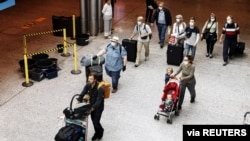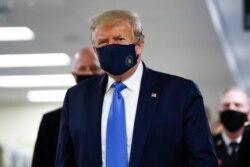The World Health Organization (WHO) warned Monday that there would be “no return to the old 'normal’ for the foreseeable future” as COVID-19 cases rise across the globe.
Nearly 13 million confirmed cases of COVID-19 have been reported around the world resulting in nearly 570,000 deaths, according to data from the Johns Hopkins Coronavirus Resource Center.
In a regular briefing streamed online, WHO head Tedros Adhanom said that “it’s never too late to bring the virus under control,” but warned that “too many countries are headed in the wrong direction.”
"Mixed messages from leaders are undermining the most critical ingredient of any response: trust. If governments do not clearly communicate with their citizens and roll out a comprehensive strategy focused on suppressing transmission and saving lives,” he said.
India set a new one-day record for its number of new coronavirus cases, while the United States continued to add to a surge in infections and Mexico surpassed Italy in terms of COVID-19 deaths.
Indian health officials said Monday there were 28,701 new confirmed cases in the past 24 hours. The country trails only the United States and Brazil in total cases since the outbreak began late last year and authorities in several states are putting back in place lockdown restrictions to try to slow the spread of the virus.
Mexico’s Health ministry announced Sunday the country’s death toll had risen to 35,006, the fourth highest in the world, and it reminded people of the need to practice social distancing, wear a mask and wash their hands.
Mexican President Andres Manuel Lopez Obrador said the outbreak is “losing intensity” in Mexico and that the number of cases was rising in about one-fourth of the country’s states. He cited the need for people to protect themselves, but also to keep the economy moving.
The United States had more than 60,000 new confirmed cases again Sunday as cases surge in many states, including Florida, Texas, Louisiana and Arizona.
Florida reported Sunday a 24-hour increase of 15,299, shattering the previous one-day high for a U.S. state by more than 3,500.
The top U.S. health official is urging everyone to wear a mask when out in public to prevent the spread of COVID-19, but he stopped short of saying there needs to be a nationwide mandate.
A day after President Donald Trump was seen for the first time wearing a face covering in public, Surgeon General Jerome Adams said on CBS’s "Face the Nation" Sunday that people need to be educated on why it is important to cover their faces instead of the “big brother” approach.
"As surgeon general, I want people to understand why they should wear a face covering, and they are going to be more likely to do it and more likely to do it willingly, and they're going to be more likely to do it when we are not watching, which is important,” Adams said.
Trump has wavered between mocking those who wear face masks and saying he doesn’t see anything wrong with it.
He was pictured wearing one Saturday during a visit to Walter Reed National Military Medical Center.
“When you’re in a hospital, especially ... I think it’s a great thing to wear a mask,” he said.
Monday brought mandatory orders for wearing masks in public in Croatia and in four Spanish regions – Andalusia, Aragon, La Rioja and Navarre.
Andalusian leader Juan Manuel Moreno said authorities there fear an influx of tourists who will walk through the streets and enter restaurants of the popular vacation spot mask-free.
Spain has been one of the countries hit hardest by the coronavirus. It began easing lockdowns last month. But some local authorities are starting to reimpose restrictions as a growing number of new cases is sparking fears of a second wave.
South African President Cyril Ramaphosa announced a renewed ban on the sale of alcohol and a new nighttime curfew Sunday as the number of new COVID-19 cases grows. South Africa has the most cases in Africa.
Ramaphosa said in a televised address that hospitals and doctors don’t have the facilities and time to deal with alcohol-related injuries right now.
In Honduras, officials announced a coronavirus curfew first imposed in March will remain in effect for another week to try to slow the spread of the coronavirus.













